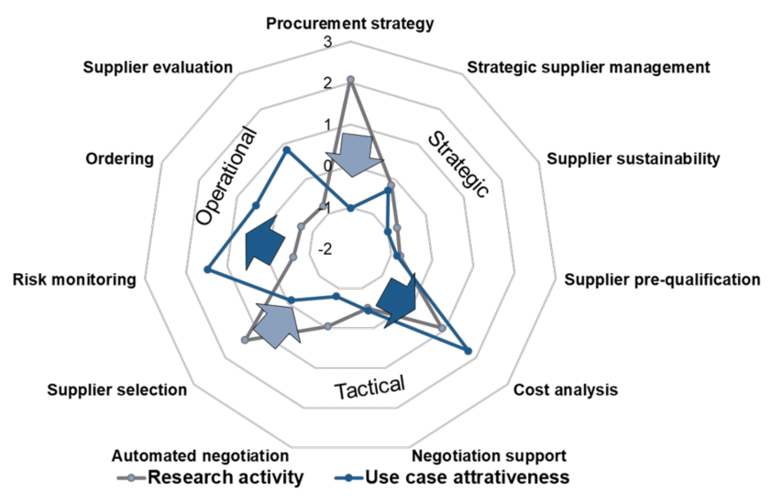
Interview: AI Adoption -- Procurement vs Sales & Marketing


(Pic Courtesy: Jan Spreitzenbarth)
Artificial intelligence (AI) is gaining traction across major corporate functions. For their part, Procurement teams across the globe are also gradually implementing AI technologies in their day-to-day operations.
Despite the great excitement surrounding the Procurement tech landscape, the function continues to lag other boundary-spanning functions, such as Marketing and Sales, when it comes to the implementation of AI solutions.
According to a McKinsey survey, the business functions where AI adoption is most common are Service Operations, Product and Service Development, and Marketing and Sales.
To find out why functions such as Marketing and Sales deploy AI better than Procurement, Beroe spoke to Jan Spreitzenbarth, a Ph.D. scholar who has taken a one-year sabbatical at the University of Mannheim and is on a research stay at MIT Sloan in Boston, Massachusetts. Jan was part of the team responsible for setting up the Purchasing Department at CARIAD SE, a newly formed division for automotive software within the Volkswagen Group.
During the past couple of years, Jan has published several papers on AI adoption in Procurement. His research area includes a comparative study of AI adoption across major corporate functions. It was a cold morning in Boston, Massachusetts, when Jan received Beroe’s video call.
As per your recent study, there are more research and practical AI applications in Sales and Marketing as compared to Procurement. As a practitioner and academic, why do you think that is the case?
Yes, our study highlights that more AI research has been conducted in Sales and Marketing as compared to Procurement. Maybe our colleagues in Marketing and Sales are doing something different -- they seem to be more adept in this area than the Procurement function.
Could it also be that Marketing is an established function while Procurement has been rising in prominence only in the past seven years or so -- especially more so now, in the aftermath of supply chain disruptions?
Yes, Marketing is generally still seen more as a value-generating function. This is one of the points I had wanted to highlight in the paper I authored along with Prof. Heiner Stuckenschmidt and Prof. Christoph Bode. A lot depends on how we see ourselves as a function. This has been highlighted in a recent article called “Moving purchasing and supply management beyond a cost-focused identity”1 in the Journal of Purchasing and Supply Management. However, if we focus mainly on costs, then we will be measured on costs. That's fine -- but there are interesting applications of AI or machine learning in procurement, targeting costs. There are many more applications out there if we broaden our scope. For example, consider the startup-business space which is buzzing with activity pertaining to supplier sustainability. Despite these new solutions, AI in Procurement is certainly not yet on the same level as in Marketing or Sales. This is not just an academic discussion -- it has real-world implications because when Sales and Marketing professionals of supplier organizations adopt technology at a faster pace, Procurement must make efforts to catch up with advanced tech adoption to match its counterparts. Why, for example, are many Procurement teams not using AI for supplier risk assessment when Sales is using AI for demand forecasting?
Your study points to a perception that AI in Sales and Marketing contributes a higher value proposition to the organization than Procurement. Is there a way to overcome this perception gap?
I think right now, due to large scale disruptions, Procurement and Supply Management have gained prominence. The top management of many companies are making Procurement their focal point. The perception gap cannot be closed overnight, but as the Procurement function connects to mega trends, such as sustainability, the perception gap could be bridged. For example, in the automotive sector, the materials must come from somewhere and are often carbon intensive. I am optimistic that Procurement will develop further as a function and play a more active role within the organization in facilitating supply innovation in the years to come. This pertains to digital procurement in general and not just AI.
Our recommendation is to closely track the value that Procurement delivers to the organization when evaluating where to invest in data, technology, and skill.
Nonetheless, although Procurement and Sales & Marketing share several commonalities, significant differences in terms of required decisions and available data also exist.
The table below is a comparison of Procurement with Sales and Marketing along with the required decisions and available data at the strategic, tactical, and operational levels:
|
Dimension |
Procurement |
Sales and Marketing |
||
|
Decisions |
Data |
Decisions |
Data |
|
|
Stragetic |
Value network |
Overall costs and quality |
Value proposition |
Overall profits and revenue |
|
Tatical |
Supplier selection |
Savings and delivery performance |
Project bidding |
Market share and customer satisfaction |
|
Operational |
Supplier evalution |
Performance measurement |
Project control |
Performance measurement |
(Source: Spreitzenbarth et al., 2021b)
In addition, it is important to distinguish between marketing and sales in the B2B and B2C contexts. An organization such as Google, Amazon, or Alibaba might generate more data on one day than business-focused service providers do in a decade. Therefore, Procurement should be compared with their negotiation counterparts in the B2B context, where the gap might not be wide.
Which segment of the procurement function could immediately benefit from an AI system?
I guess it is different for each Procurement Organization. In general, I believe it would be good to use technology for aspects where procurement lacks effectiveness. It would not be feasible to apply AI for incremental benefit.
To answer your question, based on our research, cost analytics and risk management would most benefit from AI. AI methods can also be applied to raw material price forecasting, comparing offers submitted by suppliers, benchmarking, and tiered pricing proposals. One can also consider AI application for requisitions with low supply risks. Other areas include supplier scouting as well as automated negotiation.
In addition, in a recent survey by the University of Mannheim in collaboration with the Institute of Supply Management, the quality of data was ranked as the most pressing overall performance roadblock followed by finding qualified employees, budgetary restrictions, and availability of data. All these factors are highly relevant for the successful adoption of artificial intelligence in the Procurement function and, in general, the digital transformation toward Procurement 4.0.2
The following diagram shows a comparison of research activity and use case attractiveness through standard deviations in a literature review of artificial intelligence in procurement:

(Source: Spreitzenbarth et al., 2021b)
In your latest paper, you state that the talent gap is one of the main factors preventing Procurement from adopting AI. Why is that?
Many organizations face a talent gap. Even major academic institutions struggle to attract top technical talent and often turn to a few companies based in the Silicon Valley. There is a shortage of people who know how to build the technology. The situation is like the big divide within our society -- of people who can simply use their phone or people who can create new apps. Then, if we look at Procurement Organizations today, the kind of people that are attracted to the organization certainly depends on where one works. Public procurement organizations are very different from small and medium enterprises or large organizations.
It could be argued that instead of building the technology, one could just buy it as a medium-term solution. Plug-and-play is still relevant, and many technology providers are trying to enhance their current solutions with AI and machine learning capabilities. The corollary to this is we do not need a lot of talent to use these technologies. My overall point is that a general gap of digital literacy exists today and this pertains especially to procurement because of the nature of work that has traditionally been done. Digitalization has not been the function’s strength area. Even if Procurement bought several solutions, connecting them all to a central system would require people with such skills.
Why does Procurement have a different role from Marketing within the value chain? If one were to examine this statement, the fundamental difference between Sales & Marketing and Procurement is that the former helps generate revenue for the company, while the latter is the custodian of a company’s budget, especially for spend under management. They are opposites. Procurement spends company money and hence needs to be extra vigilant about what it is spending on. No one is going to fault sales for generating more revenue, but Procurement would be hauled over the coals if it overshot the budget; hence the inherent need to be conservative even when it comes to technology choices. What are your thoughts on this?
That is an interesting perspective. I guess it is like the null hypothesis of the study we had conducted -- Procurement is naturally designed to spend company money, while Marketing helps generate revenue and hence, Procurement tends to be conservative because it is situated in a different position within the value chain.
However, procurement does have a lot of responsibility. If we are managing 50 percent or more of the total expenditure, it has a major impact on the company’s bottom line. Moreover, it is not only about costs -- it is also about managing supply quality and supply chain risk. In a way, Procurement is “reverse marketing” as it focuses on bringing the goods inside the company, while Marketing focuses on “selling” the final product. The perception of Procurement as having a risk-averse, cost-focused identity seems to play a role in the adoption of AI and analytical tools -- but this could be a good starting point for Procurement to become the future digital powerhouse.
- https://www.sciencedirect.com/science/article/abs/pii/S1478409221000170
- https://www.bwl.uni-mannheim.de/news/state-of-the-procurement-profession-survey-2022/
- The study “The state of artificial intelligence: Procurement versus sales and marketing” has been published in Advanced Studies in Supply Management book series by Springer and can be found here: https://link.springer.com/chapter/10.1007/978-3-658-38350-3_8
Related Insights:
View All
Get more stories like this
Subscirbe for more news,updates and insights from Beroe






